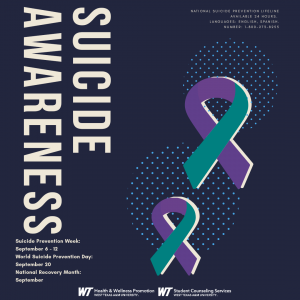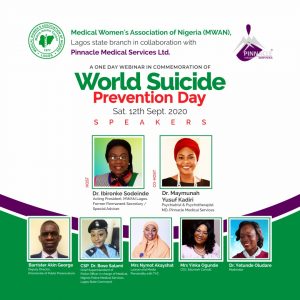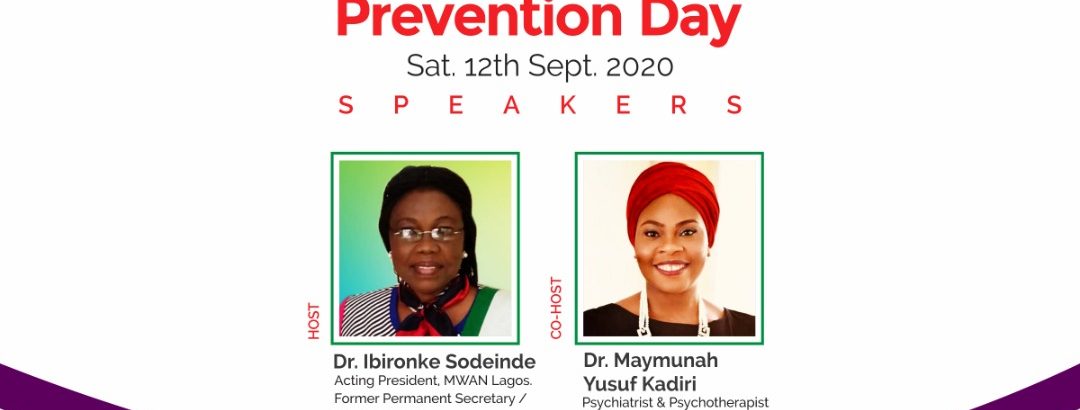Ages 15 to 19 is the youngest and leading age range in which suicide can occur, and it’s getting lower by the day through school and cyber bullying… some of the ways to overcome this is to seek for help, create physical family time and be a step ahead… ~ Dr. Tunde OLOYEDE – Consultant Orthopedic Surgeon, General Hospital Ikorodu.
According to a Professor during the One-day webinar to commemorate World Suicide Prevention Day, “Suicide is a very serious issue in public health, which is preventable with timely, well based and low cost interventions”. During the course of the heated and educative discussion, some of the tips and role mentioned by the different professionals present as speakers are;
Sexual abuse can lead to suicide… building character and engaging children early is very important, because if not done in the proper way by their parents, they look to other sources of engagement. Hence, all hands must be on deck to deal with this discourse and do more for our children, adolescents, and every one. ~ Prof Rose Ogu (MWIA)
Educators should be wiling to use the “reset button” on students and even themselves. This is because, following a pandemic – when children have been left behind and teachers also have been jobless, not earning money – they all would be returning to school with different baggage. Hence, a debriefing for the students, their educators and counselling session for parents on the realities and changes associated with the pandemic is necessary. Likewise, the power of observations is very important for the wellbeing of the students. Teachers should be courageous to ask questions from the child and parents when they see anything odd, as silence causes a lot of problems to go unattended to, which might eventually lead to Suicide. ~ An Educator (Mrs. Yinka Ogunde)
“No matter the case or situation, suicide shouldn’t be the option… Section 327 of the criminal code law under the federal law states the imprisonment punishment for suicide. However, Only “attempted suicide” can be prosecuted”.
Criminal laws have purposes and objectives. For example, In Lagos state, It’s to promote orderly society, collective protection for life and property, deal with conducts that harms the
societies and so on. Criminal administration is for rehabilitation, restoration, deterrence, prevention and retribution of criminals and criminal activities. Suicide is being criminalized in many places – Nigeria inclusive, but also undergoing decriminalization in many places because the criminalization further subjects someone with emotional trauma and suicidal thoughts to the correctional facilities which is not ideal. Suicide criminalization doesn’t fulfill any of the criminal law and administration purposes or objectives. However, the reasons for criminalizing suicide are; religious beliefs, for protection of human life and for deterrence – which is neither here or there.

Negative effects of suicide criminalization are the reduced reports of suicide cases. Likewise, the insensitive current position about mental health and care, doesn’t help and is unable
to deter anyone from committing suicide. Instead, the person who attempts suicide and is found, should be detained temporarily for rehabilitation and intention. As opposed to the usual censoring and assigning faults to the victim, rather than addressing the root cause of the suicidal ideation. Currently, the Lagos state law has been modified and a person who attempts suicide is not criminalized but placed on hospitalization order for proper evaluation, which other states also should embrace this “legislation of a better view” – that addresses the root cause of suicide. Also, the everyday constitution talks about the right to life; which interprets that an individual cannot sue the government for a guaranteed right to life, but the individual doesn’t have the right to take the life. Therefore, the government has a role to play in preventing suicide, likewise the police public relation officers who are law holders and enforcers in the country. ~ A Barrister Barrister Akin George
“Media have been found to promote suicide thoughts through their headlines and front pages. Therefore, Media houses should advocate for reporting “against the use of substances” such as sniper and continuously cultivate the habit of ending those articles with places to seek help from”.
Media kind of gave citizens the opportunity to take their lives by putting a life taking story on its front pages. This has continuously put suicide in limelight when reported via the various means available – suicides on third mainland bridge, with sniper etc. Hence, such reporting or stigmatizing should be stopped, rather, we should promote showing empathy when reporting such occurrence and a solution must always be proffered by the media. All editors and content creators must be careful about what they allow their citizens to be exposed to, and also portray more on how to get help apart from telling the gory aspects of the suicide stories. ~ Mrs. Nymot Akayshat, A Media personnel
Destigmatization should be mantra! “Men should be men” hinders crying out for help and expressing emotions hence should be stopped.
PTSD – which could lead to suicide – is common in the armed forces and part of the steps put in place to avoid stigmatization, is the creation of counselling units across all police command to cater for the officers and people that call in. Also, the unit is not tagged “Mental” but called a CSU. Furthermore, counselling units and support at grassroots level due to higher incidence in Low income areas – from lack of financial empowerment or basic social amenities – should be made available to give succour to residents. Law enforcement agencies should actively work towards reduction of GBV and substance abuse which could lead to suicide by ensuring perpetrators, defaulters, drug peddlers bear the full weight of law. The private sector also has an important role to play in suicide prevention such as; paying back to the community by implementation of poverty alleviation programs, review of existing laws to reflect current situation of community, supporting public awareness and campaign against suicide. ~ Dr. Bose Salami, Chief Superintendent of Police.
Social media is one of the major drivers of suicides and attempted suicides among young people and a contributing factor are the contents these adolescents and youths are exposed to online. Therefore, the family – by active parenting/guardianship – have a role to play in monitoring how much the children can explore.
During the questions and answers session by the participants and guests, some of the other contributions and recommendations include;
- Ensuring counselling sessions and psychologists interface with students and teachers in open informal forums for preventive sessions, before resumptions and during the school sessions.
- Ensuring Counselors are available within our communities – as a new normal – where the government is paying for their services to clients, as part of basic healthcare like visiting a health centre or general hospital for body check up.
- Suicide prevention messages should go beyond the virtual space and awareness taken to local communities in their local dialects.
- School curricula can be adjusted to accommodate introductory courses in “Mental health” and other practical topics like the “law of kindness”, “being our neighbor’s keepers”, “response to family and societal pressures” amongst others.
- Healthcare providers in community clinics should be trained to educate pregnant women going for ante-natal, so they can understand the concept of Post partum depression, PTSD and other associated mental health issues for appropriate care. Also, community mental health projects involving traditional rulers should be carried out nationwide.
- The law enforcement agency (Police force) should intensify on their roles of enforcing existing laws on sexual and substance abuse in Nigeria (which are common causes of suicide); school visits by the already being done by mental arm of the force and continuous training of police officer on mental health issues, especially, substance abuse.
- Press and Social media freedom should be used to normalize discussing challenges and demystifying illusions, we face as Nigerians.
- Responsible use of media and Suicide contagion should be taught to every media personnel.

Editor’s note:
This is an excerpt from the One-day seminar organized on the 12th of September, 2020 by the Medical Women’s Association of Nigeria (MWAN), Lagos State Branch in collaboration with Pinnacle Medical Services Ltd. to commemorate World Suicide Prevention Day. This meeting done on zoom was hosted by Dr. Ibironke Sodeinde, Acting President, MWAN Lagos and Dr. Maymunah Kadiri, Coordinator, Mental Health Committee.




Discussion3 Comments
I like this site very much, Its a real nice situation to read and incur info .
I’m not that much of a internet reader to be honest but your blogs really nice,
keep it up! I’ll go ahead and bookmark your website to
come back later on. All the best
Hi there, I enjoy reading through your article.
I like to write a little comment to support you.